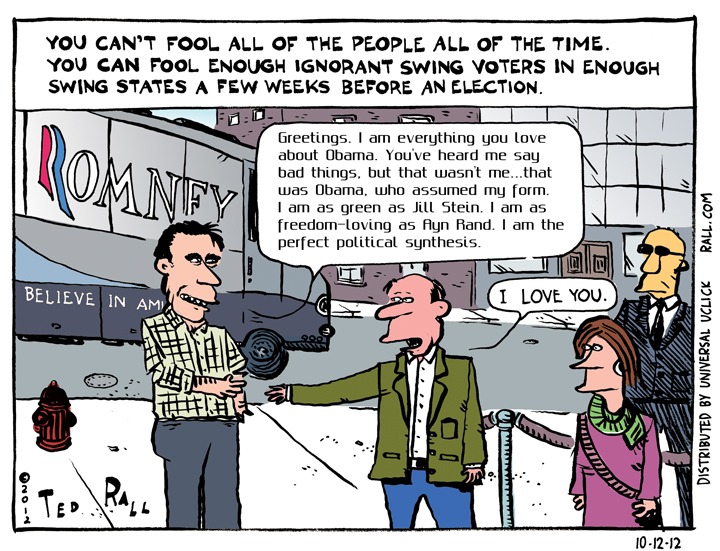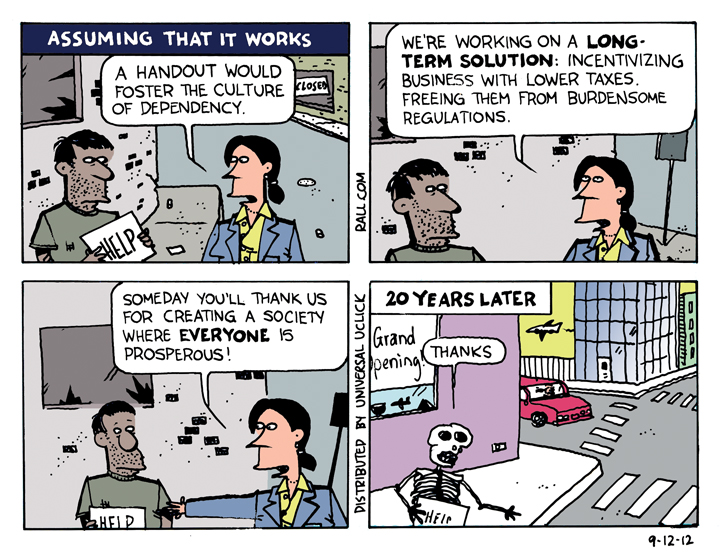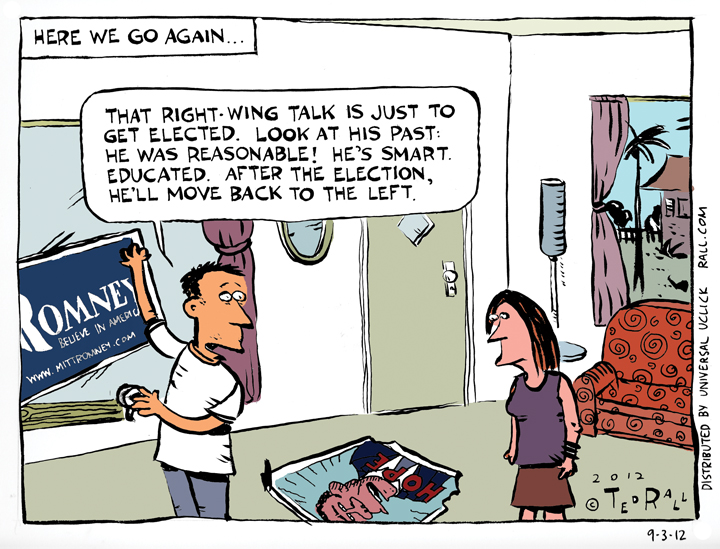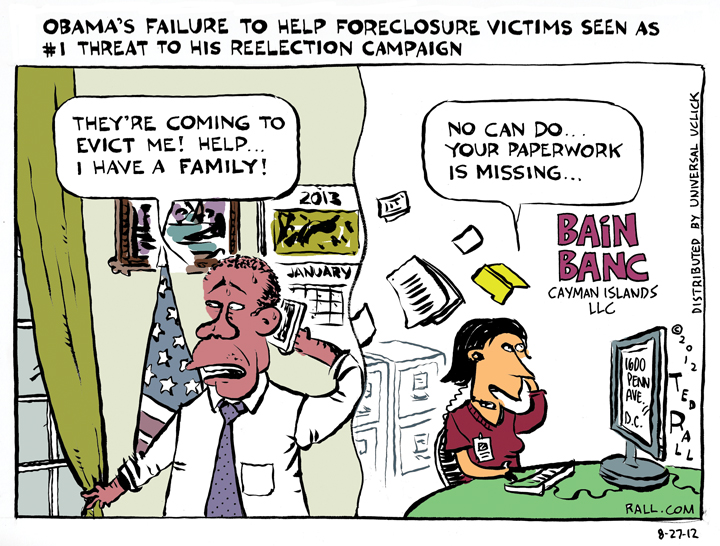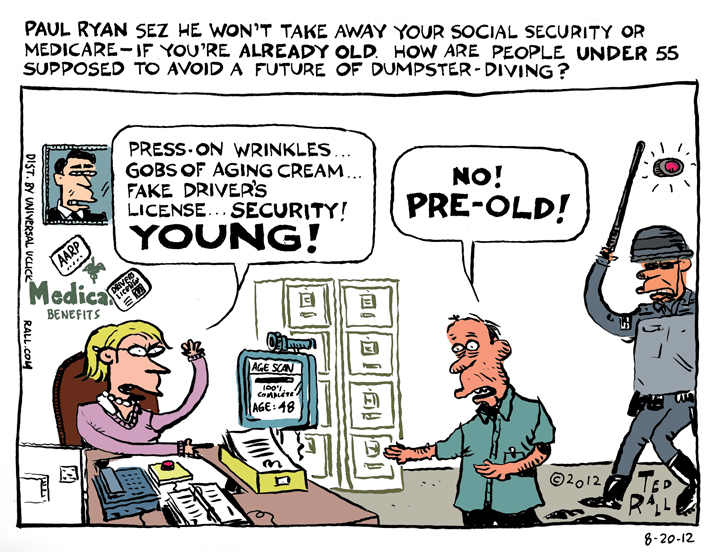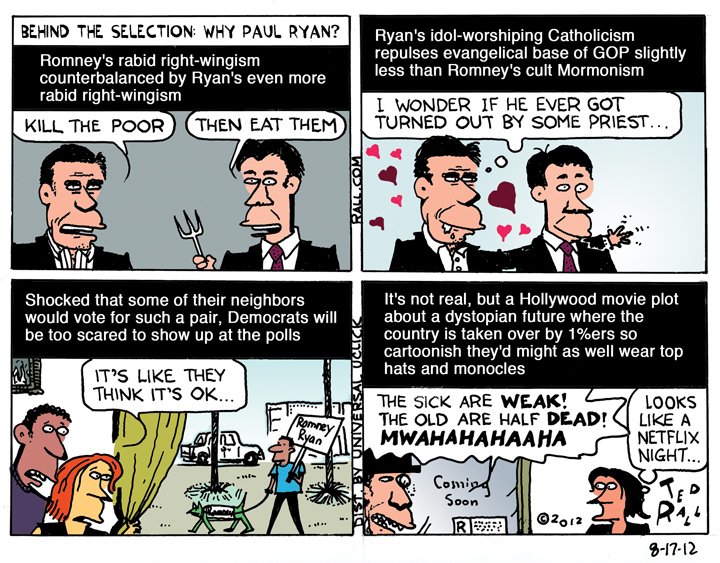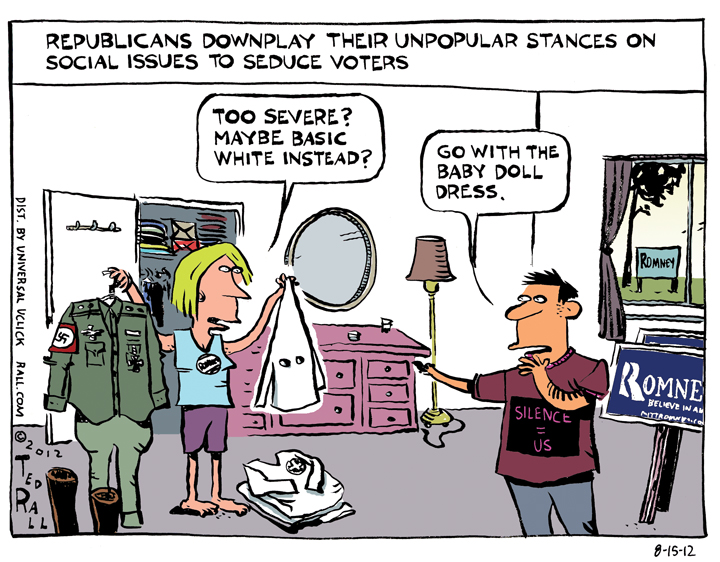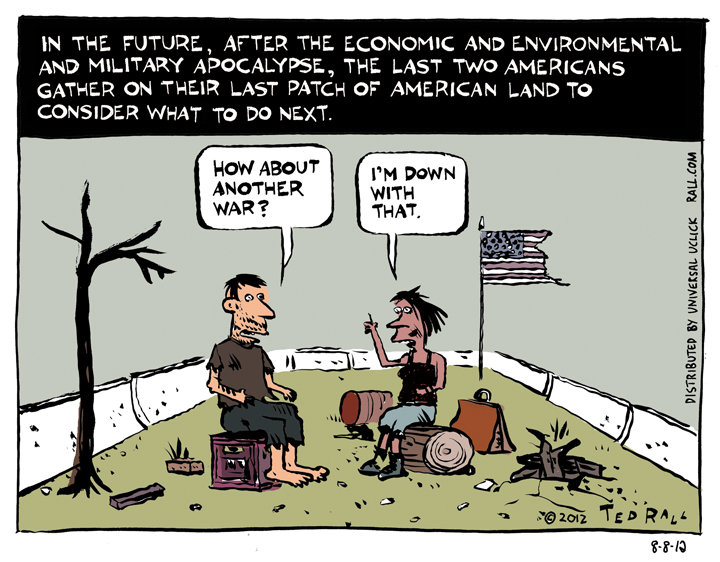Mitt Romney backs away from all the right-wing positions he espoused earlier in the campaign, especially during the Republican primaries, unveiling the kinder, gentler, Obama Lite version at the first presidential debate.
SYNDICATED COLUMN: Big Bird is a 1%er
Romney’s Silly But Salient Point on PBS
“I like PBS. I love Big Bird. Actually, I like you, too,” Mitt Romney told Jim Lehrer in the most quoted line from the first presidential debate. “But I’m not going to keep on spending money on things to borrow money from China to pay for.”
Huge news!
If deficit spending will be verboten under the Mittocracy, what will happen to all those out-of-work soldiers and defense contractors? Where will the drones crash after they run out of gas?
But let’s not talk about that either. Apparently I’m the only person in America who noticed that the military-industrial complex is about to go out of business.
People are instead focusing on Romney’s call to cut the $445 million a year the federal government–which amounts to a paltry 1.2% of 1% of the federal budget–contributes to the Corporation for Public Broadcasting, which subsidizes PBS and NPR.
My fellow political cartoonists are having a field day, echoing President Obama’s hat tip to the O.J. case: “Elmo has been seen in a white Suburban. He’s driving for the border.” The New York Times’ Charles M. Blow riffed: “Big Bird is the man. He’s eight feet tall. He can sing and roller skate and ride a unicycle and dance. Can you do that, Mr. Romney?” A co-creator of “Sesame Street” dismissed Romney as “silly.”
Silly? Definitely.
But is Romney right? Probably.
Candidates and parties aren’t important. Ideas are. If we’re ideologically consistent, if we want to appear credible when we criticize right-wingers like Romney, we left-of-center types have to hold ourselves to the same (or higher) standards as those to which we subject our enemies. We have to admit when they’re correct, even–especially–when it’s about something as trivial as this.
This is a time when we have to give the devil his due.
Until recently I was unaware of the exorbitant salaries received by executives and top employees of federally-subsidized broadcasting networks. In a 2011 op-ed for The Wall Street Journal, Senator Jim DeMint (R-SC) pointed out that PBS paid its president, Paula Kerger, over $600,000 a year–more than the President of the United States. “Kevin Klose, president emeritus of NPR…received more than $1.2 million in compensation, according to the tax forms the nonprofit filed in 2009,” wrote DeMint. “Sesame Workshop President and CEO Gary Knell received $956,513 in compensation in 2008.” (Now Knell runs NPR, which pays him about $575,000.)
Actor Carroll Spinney, who plays Big Bird and Oscar the Grouch, was paid more than $314,000 last year.
The liberal Center for American Progress countered: “While those numbers are not exactly chump change, it’s pennies compared to the salaries of another industry the U.S. taxpayers subsidize at much higher cost–Big Oil.”
But that’s red-herring sophistry.
Wasteful federal spending on overpaid executives is wrong, whether it’s for planet-murdering energy corporations, or on a network that airs free educational TV that helps ready kids for school with basics like counting, math and even Spanish.
Kill both.
“Like for-profit media companies, Sesame [and PBS] needs to pay top dollar to attract talent,” MSN’s Jonathan Berr argues, sounding like a Fortune 500 corporation defending sky-high CEO paychecks.
I disagree.
NPR and PBS do an OK job reporting the news–as long as it happens on a weekday–but that’s not the point.
If you accept public money, you’re in public service and should get paid accordingly. Which is to say, fairly–and at the lowest fair cost to taxpayers.
If you can’t find someone qualified to run NPR or PBS, or an actor up to the task of playing Big Bird, for $100,000 a year–especially in this job market–you’re not looking hard enough. Something is off-kilter when the studios of publicly-funded shows like NPR’s “All Things Considered” are centrally located and sumptuously furnished with mahogany tables and the latest high-tech gadgetry, while those of privately-owned 50,000-watt talk-radio powerhouses are situated in the slums and look like 1970s-era flophouses.
Salary figures for NPR “stars” like Robert Siegel ($341,992), Renee Montagne ($328,309), Steve Inskeep ($320,950), Scott Simon ($311,958) and Michele Norris ($279,909) are three to four times more than top-rated talk-radio hosts in the biggest markets get. How dare these 1%ers shake us down during pledge drives, much less collect federal taxdollars?
PBS only receives 15% of its funding from the feds. For NPR it’s 2%. As a former NPR exec confided, given the political heat they take over it, they’d might be better off cutting the strings. Then they’d be free to stop giving lying conservatives “equal time” to seem “fair.”
Why is the government giving broadcasters money they don’t need? There’s a much stronger argument for propping up newspapers, which remain the original source of 95% of news stories. Print media is in big trouble: the newspaper industry has shrunk 43% since 2000. Analysts say that even that chart-filled ubiquitous denizen of hotels USA Today may fold. If the feds want to do something good for journalism–and the well-informed populace required for vibrant democracy–they should start by subsidizing print newspapers.
But only if their editors and publishers don’t get paid ridiculous salaries.
(Ted Rall‘s new book is “The Book of Obama: How We Went From Hope and Change to the Age of Revolt.” His website is tedrall.com. This column originally appeared at MSNBC’s Lean Forward blog.)
COPYRIGHT 2012 TED RALL
Help!
Obama tried to finesse his response to the housing crash, rejecting a bailout of homeowners facing foreclosure in favor of a limited aid program and a bet that a recovering economy would take care of the rest. Millions of people lost their homes and the recovery never materialized. The economy is now the primary threat to Mr. Obamaâs bid for a second term, and economists and political allies say the Obama’s non-response to the housing crisis was the administrationâs most significant mistake.
SYNDICATED COLUMN: Fear of a Right Planet
Romney-Ryan Extremism Could Revive Liberal Support for Obama
Soviet citizens had to be Kremlinologists, studying subtle linguistic and tonal shifts in state propaganda, noting the seating order of party leaders at official functions, in order to predict the future direction of their lives. So too are we Americans, for without any way to really get to know our politicians—their press conferences and interviews are too infrequent and carefully stagemanaged, unchallenged by compliant journalistic toadies—we are reduced to reading signals.
Even to an alienated electorate, the tealeaves are easy to read on the Republican side.
Between Romney’s selection of Paul Ryan as his running mate, his team of Dubya-rehash economic advisors (because that worked out so well) and Tea Party favorite Chris Christie as keynote speaker at this year’s Republican National Convention, the Republican Party is in danger of doing something that seemed impossible just a few months ago: strengthening support among the liberal base of the Democratic Party for President Obama.
Granted, disappointed lefties will not soon forget Obama’s betrayals. Guantánamo, the concentration camp that supposedly holds “the worst of the worst” terrorists, remains open—although, now that the White House is reportedly negotiating with the Taliban to exchange captured Afghan ministers for an American POW, one assumes they’re not all that bad. The drone wars against Afghanistan, Pakistan, Yemen and elsewhere are an affront to basic morality, logic and decency. On the economy, this tone-deaf president has yet to propose a jobs program, much less try to push one through Congress.
But many progressives, until recently threatening to sit on their hands or cast votes for a third party, are reconsidering, weighing disgust against gathering terror as they read the signals from the gathering storm in Tampa. Where Obama fails to inspire enthusiasm, the Romney team seems determined to generate as much fear as possible that he plans to shove the needle even further to the radical right than Reagan or Bush.
Romney, who abandoned his history as a centrist Massachusetts Republican and is running as a right-winger, chose to balance his newfound extremism with Paul Ryan, an even-more-right-winger. Ryan is a vicious, overrated ideologue whose greatest achievement, his theoretical budget proposal, paints a picture of America as a dystopian hell where an infinitely funded Pentagon wages perpetual war and the top 1% of the top 1% party on tax cuts while the elderly and poor starve or succumb to treatable diseases, whichever kills them first. (In the media today, this gets you lionized as “smart,” “wonky,” and “an intellectual heavyweight.” Ryan = Sartre.) Lest you wonder whether the Ryan selection is an anomaly, wonder not—from Christie to the stump speeches to the men first in line to join a Romney cabinet, everything about Team Romney screams Tea Party, Rush Limbaugh, Ann Coulter, Ayn Rand minus the cool atheism and elitism.
This is a Republican Party that Barry Goldwater wouldn’t recognize, batso nutso, stripped of the last veneer of libertarianism, completely owned by and in thrall to figures whom the media would characterize as “extreme nationalist” or “neo-Nazi” if they spouted the same nonsense in other countries.
If I were advising Romney, I would tell him that cozying up to the lunatic fringe of American pseudoconservatism is not a prescription for victory in November, when the outcome hinges upon seducing that 5% or 10% of voters who swing both ways. Ryan isn’t as crazy (or bold) of a choice as Sarah Palin, but what Republicans don’t understand is that conservatives will vote Republican regardless of who is the vice presidential running mate or, for that matter, who is the Republican nominee for president. Lack of enthusiasm among the base wasn’t Romney’s big problem, it was Obama’s.
Romney’s biggest albatross is that he’s a terrible candidate, a guy who obviously doesn’t like people. And his campaign sucks. The deficit may or may not represent an looming existential threat—unemployment and the environment are more urgent—but “take your medicine” austerity isn’t much of a sales pitch, especially when two-thirds of the people are already feeling squeezed. Voters reward candidates who present an optimistic vision, a future in which they see themselves richer, happier and with fuller, more lustrous hair.
The fact that Romney can’t manage to put forward a credible economic program doesn’t help either. Since his entire campaign is predicated on the argument that he’s the economy guy and knows how to fix it, he needs to cough up a plan.
However, my real concern is that Romney’s gangbusters right-wing extremism lets Obama and the Democrats off the hook.
If all Democratic strategists have to do to attract progressive voters is to frighten them with greater-evil Republicans, when will people who care about the working class, who oppose wars of choice, and whose critique of government is that it isn’t in our lives enough ever see their dreams become party platform planks with some chance of being incorporated into legislation? In recent elections (c.f. Sarah Palin and some old guy versus Barry), liberals are only voting for Democrats out of terror that things will get even worse. That’s no way to run a party, or a country.
(Ted Rall’s new book is “The Book of Obama: How We Went From Hope and Change to the Age of Revolt.” His website is tedrall.com. This column originally appeared at NBCNews.com’s Lean Forward blog.)
COPYRIGHT 2012 TED RALL

